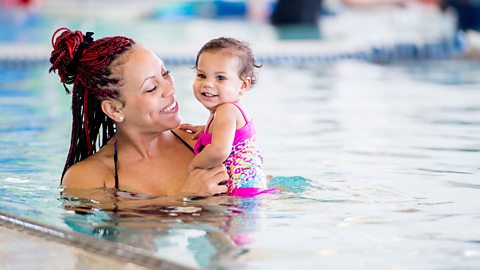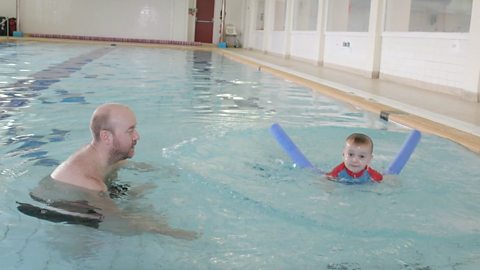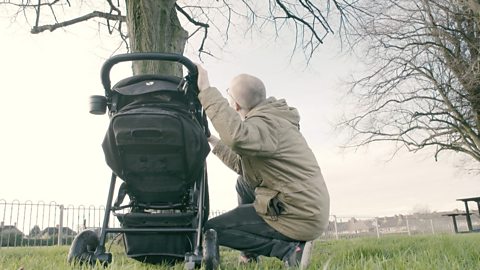Itโs been difficult not to be inspired by the performances of the British swimmers at the 2020 Olympics, no matter your age.
The likes of Adam Peaty, Kathleen Dawson and Tom Dean all played their part in Team GBโs most successful Games in the pool of all time.
But whether you and your little one are eyeing up future Olympics or just want to have fun in the local swimming pool, you might be wondering when the best time to start swimming lessons is.

When can babies go swimming
Head of Swim Englandโs Learn to Swim programme, Katie Towner, says even newborn babies can make a big splash.
She said: โI would say as early as possible.
โIf you are thinking of starting from birth, think about the setting that you're going into. There are a number of hydrotherapy pools out there that are obviously a warmer and calmer environment than your local authority public pool. Local authority pools will also offer specific baby and toddler sessions. It's worth checking ahead to ensure the environment is right for your babyโs first experience."
Some local authorities will take children for swim sessions from four months old, says Katie.
Babies going into the pool is great to see. It's a bonding experience for them and the parent as well.
When can you start swimming lessons for your baby

At an early age, swimming lessons for young babies are about gaining confidence in the water.
By taking a child to swim at an early age, they can develop skills in the water at the same time as theyโre beginning to explore their physical abilities on dry land.
But donโt expect to be sewing any swimming badges onto their costumes too early on, Katie explains.
โWhen we talk about learning to swim, a lot of parents think that they want to see their child swimming the length or width of the pool but actually thereโs a lot of skills involved in getting to that point.
โA lot of lessons you'll see for babies and young toddlers are delivered using fun and engaging activities. So there'll be nursery rhymes that they're familiar with or games.โ

Can babies learn to swim in the bath?
Katie also suggests building babiesโ initial water confidence at bathtime.
โLearning in the bath can be really helpful. They can blow bubbles or play with toys like watering cans to pour over their heads. You can try getting them to lay back and put their ears in the water, because that sensation can be quite unusual for children when they first get in the pool if they've only ever sat up in a shallow bath.โ
Getting your child used to being in the water is important as itโs natural they may be nervous or unsure about a new experience. Itโs not only strange for them โ it might feel quite daunting for you as a parent taking a newborn to your local pool.
Katie says any lesson provider should be able to support you to take those first steps.
Babies can be very slippery when wet, so holding them in the pool is a new challenge.
โI have never really come across an adult and child lesson that takes place in water deeper than standing depth, so youโre not having to tread water and deal with the baby at the same time.
โIf you are nervous, your provider should give you an induction and take you around the pool site before you even go for your first lessons. Be open and honest with your needs and any of your concerns with your provider and teacher and they should be able to help you.โ
Parents find inventive ways for their little ones to have bathtime fun.
Why should babies learn to swim?
Katie, who still teaches swimming alongside her programme role, says that if you want to leave it until later, then older children and even adults can learn to swim.
โI think itโs an inclusive activity. Itโs one that everybody starts on a level playing field. Irrespective of age, ability, disability, everyone starts at the same point in a fun environment.โ
But if youโre looking for a fun bonding activity for you and your child, that can also begin to teach them valuable skills, swimming might just be perfect for you โ whether itโs formal lessons or even just some family fun in the pool.
โItโs time with your child, just you and them, with skin-to-skin contact. Youโre engaging with them, face-to-face with them, on their level.
You see how much progression children can make in such a short period of time. They start not wanting to even get their hair wet, but then theyโre swimming a width of the pool, jumping in or splashing their parents.
So whatever the age, thereโs no time like the present to dive in!
Always make sure your child is supervised in the water and follow the safety instructions of staff whenever you're at the pool.
Find out more about learning to swim, safe and comfortable ways to hold your child while in the water and details on at home activities or any other equipment you may need before going in the pool.





